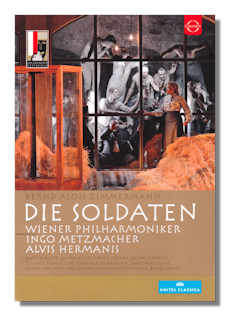
The Internet's Premier Classical Music Source
Related Links
- Zimmermann Reviews
- Latest Reviews
- More Reviews
-
By Composer
-
Collections
DVD & Blu-ray
Books
Concert Reviews
Articles/Interviews
Software
Audio
Search Amazon
Recommended Links
Site News
 DVD Review
DVD Review
Bernd Alois Zimmermann

Die Soldaten
- Laura Aikin, soprano (Marie)
- Gabriela Benacková, soprano (Countess de la Roche)
- Tanja Ariane Baumgartner, mezzo soprano (Charlotte)
- Renée Morloc, contralto (Stolzius's mother)
- Wolfgang Ablinger, tenor (Sperrhacke Pirzel)
- Daniel Brenna, tenor (Desportes)
- Matthias Klink, tenor (The Young Count)
- Boaz Daniel, baritone (Eisenhardt)
- Tomasz Konieczny bass-baritone (Stolzius)
- Alfred Muff, bass-baritone (Wesener)
Vienna Philharmonic Orchestra/Ingo Metzmacher
EuroArts DVD 2072588
Also available on Blu-ray 2072584: Amazon - UK - Germany - Canada - France - Japan - ArkivMusic - CD Universe - JPC
From EuroArts this is a spectacular (though never showy) DVD of the production (directed by the Latvian, Alvis Hermanis) at the Salzburg Festival in August 2012 of Bernd Alois Zimmermann's (1918-1970) opera in four acts, Die Soldaten ("The Soldiers"). The composer's only completed opera was written from 1958 basing his own libretto on the original work by Jakob Michael Reinhold Lenz (1751-1792) but introducing so many even then innovative techniques (multiple simultaneous scenes, multimedia, projected filmed scenes, loudspeakers on stage, for instance) as effectively to "modernise" Lenz's original work.
Die Soldaten demonstrates and reflects on the downfall of Marie (Laura Aikin, soprano), daughter of Wesener (Alfred Muff, bass-baritone) and fiancée of Stolzius (Tomasz Konieczny, bass-baritone). It explores the destruction, cruelty and devaluation of the individual that result from the involvement with Marie of Baron Desportes (Daniel Brenna, tenor). While Lenz's drama was set in eighteenth century Strasbourg, Zimmermann chose French Flanders in 1775, partly to echo his experiences in the Second World War on the Western Front… they match events and the environment of the First World War too, of course.
Time was a preoccupation of Zimmermann's. He believed in the concept of a sphere: everything in the past and future (also) permanently exists in the present. Only our perception orders them. That is why Die Soldaten takes place over three consecutive days at the same time of day, even though a literal narrative of the opera's events would have taken months, at least.
This production of Die Soldaten does an excellent job of conveying this tension between a linear (perception of) time and – presumably – Marie's opportunities to avoid her fate on the one hand; and multiple simultaneous human forces at work on the other. Most of the main action takes place on the foreground of 40-meter-wide stage of Salzburg's Felsenreitschule. Prominent are bales of straw. Both rustic and more "salon-like" furniture is used to represent the life of the time. There are also beds and glass booths/showcases additionally to convey the sexual dynamic: the female characters appear inside. Across the entire back of the stage are eight arches. These both suggest the sequence of time, and display more symbolic action such as the passage of horses and stylized crowds. Marie (actually her double) walks across the stage on a tightrope at one point. This is less subtle, perhaps, than it is effective. There's a visual and kinetic unity to the production which support well the pessimism and acerbic nature of Zimmermann's conception. At the same time, the filmed DVD can focus on faces, on Marie's pregnancy, on the nuanced gestures and studied (though never artificially so) body language of the singers. The acting is compelling.
A twelve-note work, Die Soldaten must invite comparison with Wozzeck, and Lulu. In fact Zimmermann's work is more metaphorically rich; there are more gestures; the language is more declamatory; if anything more focused. The intensity is heightened by he use of color… electric blues and light browns predominate. The DVD reveals and facilitates our appreciation of all of this well. And we have, of course, the advantage of singers in closeup. Although replete with subtitles in English, French and German and the other usual high standards of EuroArts music DVDs, this is not a "record" of the production; so no featured audience or orchestra. At the same time, nor does it attempt to overlay contrived visual effects.
Rather it's an honest, successful and persuasive video performance with excellent sound: a technically compelling experience. The singers – and of course the Vienna Philharmonic – are superb. The vocal roles are technically extremely demanding in terms of range in particular. Though you wouldn't know that from this performance. The understanding that each character has of Zimmermann's psychological insights is highly successful. Above all, these are insights into the universality of the themes that he treats. Particularly convincing dramatically are his perspective on lust, salvation, need and integrity. As an opera composer Zimmermann uses the genre very effectively in order to make this insight work on stage. The Salzburg production and DVD enhance this very well.
There is, for example, (visual) excitement, the repetition of dramatic and musical elements, of realism (the soldiers bored in their barracks – mending clothes, polishing boots, cutting hair). This is blended well with the climacterics, the moments that must define Marie's fate – especially the heart-rending final scene – and the "strategically" symbolic (raunchy horse-riding, for example).
This is definitely a version to add to the prized discography of Zimmermann's work. It affords us insights into the characters' minds, passions, weaknesses and – paradoxically, thus, as humans – strengths which are as deep and complete as are those in the other reference recording: on CD, by Kontarsky with soloists and the Stuttgart State Orchestra (Teldec 667080). The documentation is minimal – just two sides of commentary and the relevant production data. In some ways, that's all you need: Die Soldaten is such an eloquent anti-war piece. Yet it builds on exposure of frailty not polemic. A success on every front.
Copyright © 2013, Mark Sealey





















